
views
X
Trustworthy Source
PubMed Central
Journal archive from the U.S. National Institutes of Health
Go to source
[2]
X
Research source
You can deal healthfully with an abortion by making an informed decision, preparing yourself for the procedure, coping with the process, dealing with the aftereffects, and practicing forgiveness.
Making the Choice

Analyze the choices that you have. In order to make an informed decision you first need to think about the different options you have. Know that people who chose an abortion versus another type of option, fare about the same in general in terms of psychological outcome. Try writing out the pros and cons. Here are some example options: Become a parent Choose adoption (open or closed) Sign over guardianship to a family member or loved one Terminate the pregnancy

Consider your personal feelings and beliefs. Some people cannot stand the idea of abortion, some are ambivalent, and others believe it is a human right. You may be anywhere along the spectrum. It is also important to consider your own feelings towards being a parent. Your thoughts and feelings are important. Do you have strong religious views about abortion? How do you feel about other people who have abortions? Do you feel ready to be a parent? If you keep the pregnancy, would you want to be able to see the baby? Would you be okay with people knowing, and potentially judging you, if you aborted the pregnancy? If you're young or unmarried, would you be able to handle people judging you for being pregnant?
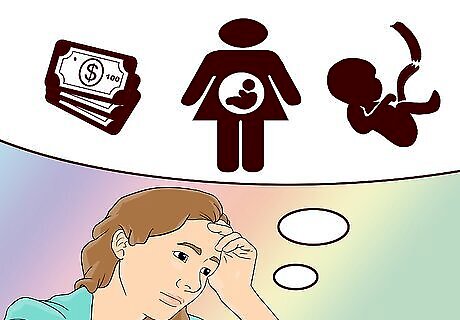
Consider practical issues. Envision different futures for yourself: one in which you keep the pregnancy and the baby, one in which you carry the pregnancy and then put the baby up for adoption, one in which you terminate the pregnancy, et cetera. Can you afford to have a child? Can you afford prenatal vitamins, medical expenses, and taking days off work for appointments? What would be your future, and your family's future, if you had a child? Are you willing to tell a parent or go before a judge if your state requires it? Can you psychologically handle an abortion? Would you have people to support you? Can you psychologically handle being pregnant and giving birth? Would you have people to support you? Would your family judge or withdraw support from you if they knew you were pregnant? Are you in danger of being abused? Do you have medical issues that would make pregnancy or childbirth dangerous?

Talk to someone you trust. Support will help you weigh your options and prepare for whatever choice you want. Support helps you feel more confident in your ability to deal with the situation. Whether it’s a parent, a friend, a mentor, a clergy member, or a counselor, you need someone to be able to turn to for comfort and support. Look for someone nonjudgmental who won't blab about it without your permission. Get support from your partner, if you have one. Get support from parents if possible. Find support elsewhere if you do not get it from your partner or parents. Try talking to friends or siblings.Tip: You do not need to tell people who aren’t supportive. Individuals who try to get support from people who are not supportive have more psychological distress. (If you are 18 or over, you are not obligated to tell anyone.) If you aren't sure whether you can trust someone, err on the side of caution.

Talk to or read from other people who've experienced abortions. Discussing your thoughts and feelings with others who have endured a similar situation can help ease your anxiety not only about the procedure, but about your decision to terminate the pregnancy. Getting support during the process and help you feel like you're not going through it alone. Talk to any friends that share your beliefs, especially if they have also had an abortion in the past. Be cautious about pro-life organizations. These may use manipulation or misinformation in an attempt to pressure you into keeping your pregnancy.

Speak with a medical doctor. If you found out you are pregnant by using an at-home pregnancy test, you may want to confirm you are pregnant by seeing a doctor. If you haven’t decided on whether or not you want to terminate the pregnancy, you can learn more information to help you make your decision. Ask a lot of questions at your initial appointment. Every Planned Parenthood has staff members trained to discuss your concerns.

Understand the effects of the decision. People who have an easier time making the decision, who are content with the choice, and who terminate unwanted pregnancies, show an easier time dealing with the abortion process. Take time to think about it. A hasty decision may be one you regret. Take time to weigh the options and settle on what you think is best.
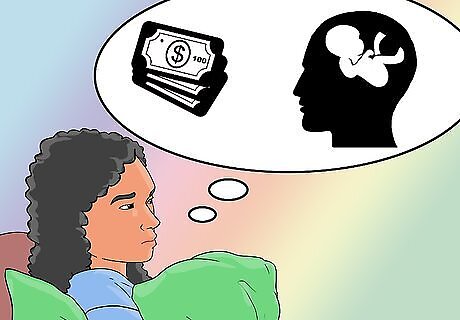
Be aware of your risk factors. Both surgical and medically-induced abortion is considered very safe, with only about 1% of people experiencing complications. In fact, it's safer than pregnancy and childbirth. Most people do not experience significant psychological consequences following an abortion. You may need extra support if you have: Mental health difficulties Difficulty coping with stress Financial troubles Conflicted feelings about abortion Negative beliefs about sexual activity or abortion
Preparing for an Abortion
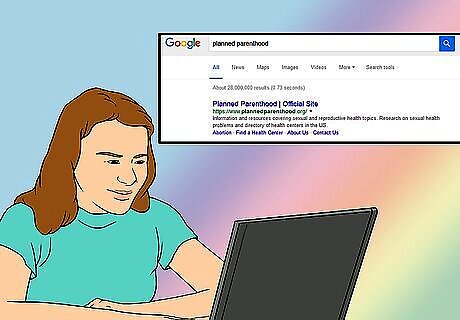
Research different clinics. If you have decided to terminate the pregnancy, you will want to find out where you want the procedure to be performed. You can ask for a referral from your medical doctor. Search for providers on Planned Parenthood’s website.

Be informed. Knowing what to expect can help things go smoothly. Call ahead or speak to a staff member or doctor about what to expect. Find out about the cost. Some services can be low-cost or free, while others can be pricey depending on where you choose to go. Understand abortion laws in your state. Find out about the different types of abortion and which one will be best for you. If you ask the doctor, they will give you a summary before the procedure and walk you through it while it is happening.

Understand your emotional process. Abortion-related stress tends to be greatest before the abortion takes place. There is no "wrong" way to feel. Some people feel negative emotions like sadness, anger, and guilt. These may be mild or intense. Other people have an easier time, and feel no more strongly than they would towards any medical procedure. You may be nervous or scared, and this is okay. Confide in a trusted person (someone who is a good listener) and explain your feelings. Talk to others who have been in a similar situation. Look online for support groups or forums to discuss your concerns. Make sure they are pro-choice forums.

Prepare materials for after the procedure. You may want to take it easy after the abortion, so prepare for a relaxing day or two at the house. Make sure you have plenty of maxi pads for bleeding after the procedure. (Your doctor may recommend pads instead of tampons.) Get a heating pad or hot water bottle to help with cramps. Get your chores done, like laundry and grocery shopping. If you experience cramps, you might want to take it easy. Get some books, movies, and other relaxing activity materials together. Try scheduling time with loved ones to watch movies.
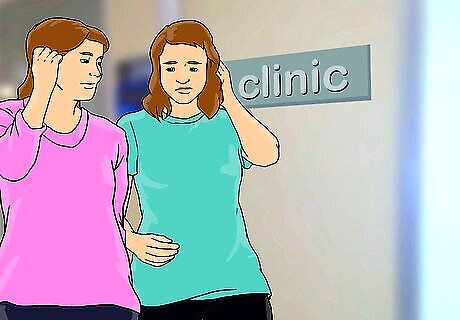
Get someone to escort you to an abortion clinic if possible. This person can provide emotional support. If you are going to be sedated during the process (i.e. given medication to relax you), then you will need someone to help you get home safely. Try bringing along something that distracts or comforts you, from sudoku puzzles to a comfort object. Before the procedure starts, begin focusing on your breath, taking deep inhales and exhales.
Dealing with Physical Aftereffects
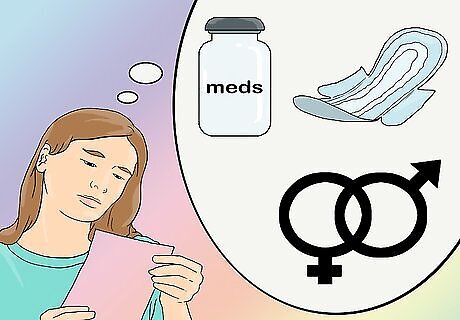
Listen to all post instructions. The clinic should give you specific instructions on what to do once the procedure is over. Take medication as directed. If you want to, take advantage of the pain killers made available to you. Instructions may include to use pads instead of tampons during the bleeding process. Do not sit in water, douche, or place medicines in your vagina afterwards. (You may shower whenever you wish.) Many doctors recommend you do not insert anything into your vagina or have vaginal sex for one week after the procedure. You may need to rest after the procedure.
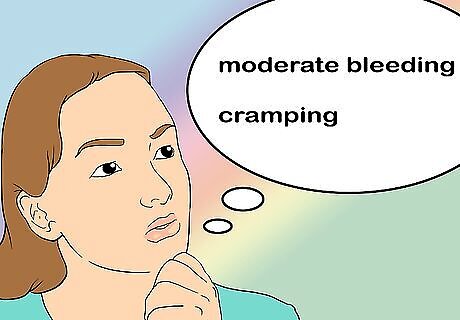
Know the common side effects. Planned Parenthood has information about what to expect during and after each type of abortion. Bleeding (like a period) and cramps are the most common side effects. You can expect some or all of these: Light to moderate bleeding, similar to a menstrual period, which may start right away or in 3-5 days after the procedure Significant cramps Fatigue Tenderness in the breast or chest Weird-looking discharge (red, purple, brown, or black) which may include some blood Chills Nausea, vomiting, or diarrhea for the first 24 hoursKnow when to call a doctor. Prolonged heavy bleeding (bleeding through 2 pads per hour for 2 hour or 1 pad per hour for 3 hours), blood clots larger than the size of a lemon, severe pain/cramps, fever, and strong-smelling discharge are not normal. Contact a healthcare professional right away if any of these things happen.
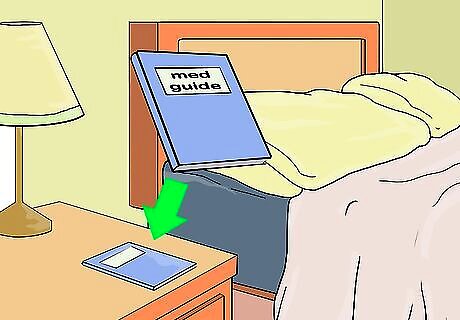
Place your after-care instructions somewhere where you can easily access them. Your doctor will give you information about how to take care of yourself, along with a phone number to call for any questions or concerns.

Consider scheduling a follow-up appointment. Your doctor might ask to schedule a follow-up appointment in 2 to 4 weeks.

Rest for the remainder of the day. For an aspiration procedure, you can usually return to regular activities the next day. Recovery after a dilation and evacuation procedure may take longer.

Take a few days to yourself if you need them. It is important to take time to heal both physically and emotionally from the stress of undergoing and then terminating a pregnancy. For example, spend at least an evening watching comedies, eating ice cream, and listening to your favorite music. Don’t take on anything new that is stressful if you can avoid it. Try doing something creative, such as painting, making music, or writing. Some people find it helpful to feel productive; choose a task that is relaxing and enjoyable.
Handling Negative Emotions

Make time to process things if you are feeling grief or other difficult emotions. For some people, an abortion is a significant life event, and coping can be hard. Identify any rituals, traditions, or ceremonies you wish to engage in. Know your triggers and how to deal with triggers if they should arise. For example, if seeing other pregnant people is a trigger for thinking negatively about the abortion, then identify a positive way of coping with this situation. For example, you could take a deep breath and say to yourself, “Everyone has a choice. Others may choose to carry their pregnancies to term. I may someday want to do the same.”

Make time for your emotions. Some people feel only relief. Others may feel conflicting feelings like loss, numbness, guilt, sadness, or even regret. Don't hide from your feelings. Instead, face them, and decide the best way to process them. If this is a loss of self, try making a list of the things you like and the things that make you unique. If it's a loss of the pregnancy, work on communicating with the entity that you feel loss for. Some people find it helpful to do remembrance activities. Recognize that no feeling is too small. Take every single one into account. It is not always necessary to feel only happiness about having a baby, nor only sadness about an abortion.

Acknowledge difficult feelings towards people involved in your situation. Not everyone responds with the love and support that you hoped for. If things got bad, you may be feeling hurt, lonely, resentful, frustrated, betrayed, or unheard. You may be upset with: The person who got you pregnant People who judged or criticized you People who you turned to for support, but responded with judgment or cruelty

Keep a journal. It may be helpful for you to track your feelings as time progresses and may help you gain perspective on how you were feeling and why you made the choice you did. Write down your thoughts about terminating the pregnancy. Do you have fears or worries? Write down your feelings about the abortion and how you can cope with them.
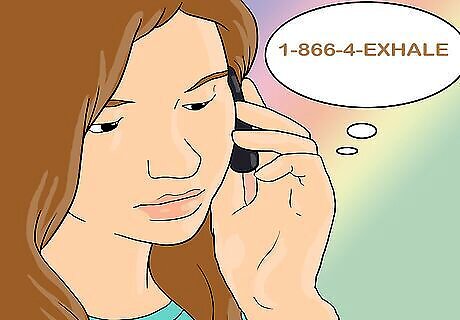
Reach out to others. Support is crucial to every stage of the process of discovering and terminating an unwanted pregnancy. There are books and online resources available. Many abortion centers also offer offer post-abortion counseling, or can refer you to a good counselor. Visit Exhale for support and the Exhale hotline, 1-866-4-EXHALE. If you feel no regret, you can visit www.imnotsorry.net. If you're struggling, try www.passboards.org to connect with other people who have struggled after an abortion.

Find peace, whatever that means for you. This is easy for some people and harder for others, depending on the situation and your feelings. Some people struggle with forgiving others or themselves. Don't blame yourself for what happened. You did the best you could in a tough situation. Learn from it and let it be. Try to forgive people who didn't respond perfectly, but ultimately meant well and wanted to help.

Avoid harmful coping mechanisms. Avoid using substances such as alcohol or drugs as a way to cope. This may help in the short-term, but if you are dealing with difficult emotions (depression, grief, loss), substances may only prolong and exacerbate your emotional pain in the long-run. Try exercise, journaling, talking to a therapist, talking to a friend, creating art, or anything else that may help you process or deal with negative emotions. Make an appointment with a doctor or therapist if you are feeling too overwhelmed, or if you fear that you will turn to harmful coping mechanisms.

Give it time. Don't pressure yourself to feel happy and normal right away if you don't. Even if it's hard now, that doesn't mean it will be hard forever. If you're struggling, look into therapy or counseling services.















Comments
0 comment